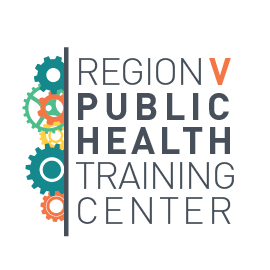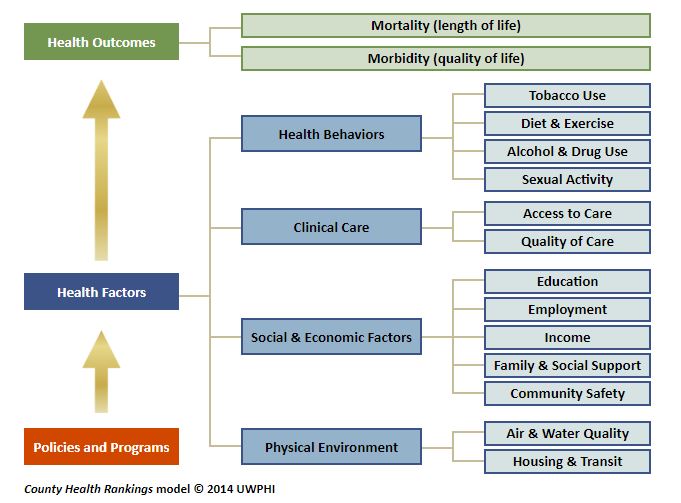Resources
The Region V Public Health Training Center has a variety of resources to share from past collaborations, current events, and more. Take a look at our general resources below, or keep scrolling to view subject-area resources, like those focused on Mental Well-Being.
Note that resources often link to external sites and are not always affiliated with the RVPHTC.
General Resources
Looking for a better way to budget? What about injury prevention? Check out these general resources from the RVPHTC and our partners.
CDC Learning Connection
Find information on a myriad of topics, including COVID-19, on the CDC Learning Connection. The Learning Connection offers a variety of digital trainings, toolkits, resources, and more.
That's Public Health
That’s Public Health is a video series by the American Public Health Association covering a variety of public health topics to spread awareness in a quick, informational manner.
NACCHO 2022 Advocacy Toolkit
This toolkit educates our members on how to educate and engage with their elected officials about the critical work of local public health and what resources are needed to keep communities safe. The toolkit explains the difference between education, advocacy, and lobbying, and offers strategies for how to effectively communicate with lawmakers through a variety of engagements.
Budgeting & Financial Management
This webinar focuses on budgeting practices within local government and features speaker Joe Gris of the Vanderburgh County Health Department in Indiana.
Building Private-Public Partnerships
The Federal Emergency Management Agency (FEMA) offers the Building Private-Public Partnerships guide, providing recommendations and best practices to establish and maintain a private-public partnership. These partnerships should work together to help coordinate mitigation, response and recovery planning and preparedness.
The Building Private-Public Partnership guide builds on the recent National Response Framework update, which focuses on non-governmental capabilities to stabilize community lifelines while addressing the continued need for aligning government efforts with the private sector.
Injury Prevention
U-M Injury Prevention Center Massive Open Online Course (MOOC)
Injury is the leading cause of death for children and adolescents. This course, designed for training a variety of professions and knowledge levels, draws from a multidisciplinary panel of expert researchers and practitioners using lectures, interviews, and demonstrations. Also relevant for educators, coaches, child care providers, and parents, the course will help you apply useful, evidence-based strategies and interventions.
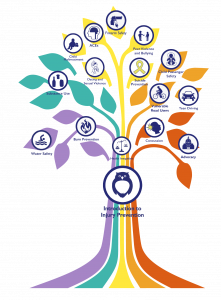
Science of Firearm Injury Prevention Among Children & Teens Online Course
Through lectures and interviews from over 35 of the leading firearm injury researchers around the country, and activities, readings, discussion boards, and quizzes, learners can become familiar with the epidemiology, prevention strategies, and policy efforts related to pediatric firearm injury prevention.
Indiana Affiliation of Recovery Residences (INARR)
This presentation focuses on defining and understanding recovery housing and it’s importance to the recovery community. Recovery Residences also play a role in Indiana’s efforts to end the Opioid Epidemic.
Speaker: AhNonda Bates, MS, LCAC- Indiana Affiliation of Recovery Residences
What Works for Health: Evidence for Decision-Making
What Works for Health provides communities with information to help select and implement evidence-informed policies, programs, and system changes that will improve the variety of factors that affect health. The research underlying this site is based on a model of population health that emphasizes the many factors that can make communities healthier places to live, learn, work, and play.
Click the image to be taken to the interactive model and website.
Curated Trainings
Before we develop our own training, we take an inventory of what’s already available from other organizations. In this way, we’re able to craft new training around areas of greatest need and interest as well as avoid duplicating material. This inventory is an ongoing resource that is available for you to access to broaden your knowledge of a variety of public health topics which include:
- Tribal Health and Climate Change
- Physical Activity and Health
- Rural Health
- HIV and HEP C
- Maternal Child Health
- Air Pollution, Housing, Asthma
- Community Violence
Communications
Whether it’s the dissemination of general information or communicating with your community during a crisis, effective communications are an important part of a healthy, equitable community.
Social Media Toolkit (NACCHO)
This toolkit from the National Association of County and City Health Officials is a recently updated version of their comprehensive social media communications toolkit. Includes information and related to selecting the right platforms, developing a content calendar, dealing with crisis communications, and more.
CDC Communication Resources
This webpage from the CDC offers a multitude of communications resources, designed to make your health communications easier. Includes information and media related to COVID-19, Flu, and more.
CDC Crisis & Emergency Risk Communication (CERC)
Crisis & Emergency Risk Communication (CERC) can make a world of difference when communicating during a health event, natural disaster, or other crisis situation. Leverage these resources from the CDC to better create and implement your crisis communications.
Don't Panic: Principles of Crisis and Risk Communication Scenario
Offering Continuing Education Credits (CEU), Don’t Panic: Principles of Crisis and Risk Communication Scenario is a one-hour online training designed to support the development of health messaging for general and special populations.
Don’t Panic: Principles of Crisis and Risk Communication Scenario
Risk Communication for Emergency Preparedness
Part of the Emergency Preparedness Leadership Series, Risk Communication for Emergency Preparedness further develops your skills in risk communications.
Public Health Guide to Social Media 101
The Michigan Public Health Training Center (PHTC), a part of the Region V Great Lakes Public Health Training Center, is pleased to offer this introductory guide to using social media in public health. There are many established resources available to support your use of technology in advancing health messages – however, social media in particular is an ever-evolving technology. The Michigan PHTC was pleased to partner with the University of Michigan Taubman Health Sciences Library to offer an online training entitled Social Media Tools since 2011, but recognized a need for updated information in 2015. Trisha Zizumbo, BS, MSA, provided her expertise in building upon foundational resources with current information in the updated Public Health Guide to Social Media 101.
Health Equity
Whether it’s the dissemination of general information or communicating with your community during a crisis, effective communications are an important part of a healthy, equitable community.
Health Equity in All Policies (HEiAP)
In 2016, as a result of the ongoing lead water crisis in Flint, the Genesee County Board of Health proposed a Health Equity in All Policies Resolution that was approved by the Genesee County Board of Commissioners. Health Equity in All Policies (HEiAP) is a systematic and comprehensive change in decision-making processes to ensure health and equity are considered before a decision is made. The Genesee County Health Department, with support from the National Association of County and City Health Officials, the Community Foundation of Greater Flint, Community Based Organization Partners, the City of Flint and the Michigan Civil Rights Commission hosted a Health Equity in All Policies workshop on Monday June 4th at the Holiday Inn Gateway Center in Flint, MI. The purpose of the workshop was to engage policy makers, local government officials, and community groups in a discussion about what HEiAP is and how it might be implemented in Genesee County.
Health Equity in All Policies filmed at the June 2018 workshop in Flint, MI. Two sessions from the workshop were recorded and are available to view:
Policing as a Public Health Issue
There are many health and health equity concerns associated with police and policing. Moving beyond the statement that policing is a public health issue, this webinar will provide some historical background of policing and public health in the U.S., as well as information on the current state. This presentation will also provide strategies and resources for policing reform.
View Recorded Webinar
Slides are available for download here.
After viewing the webinar, please complete this brief evaluation survey.
Speakers:
- Paul Fleming, Assistant Professor, Dept. of Health Behavior & Health Education, University of Michigan School of Public Health
- Maria Thomas, Advocacy Director, C.S. Mott Children’s Hospital; Director of Community Benefit and Community Health Needs Assessment, Michigan Medicine
- Jimena Loveluck, Health Officer, Washtenaw County Health Department
This webinar is offered by the Washtenaw County Health Department, UMSPH Public Health Practice, Michigan Institute for Clinical and Health Research, and the Region V Public Health Training Center.
COVID-19 in Washtenaw County: A Health Equity Series
There are many health equity concerns that have arisen or worsened under COVID-19. This five-part series will discuss current health equity issues related to the pandemic as well as resources and strategies to address them, particularly in Washtenaw County, MI. While the series will emphasize the Washtenaw County, MI context, content may be of interest to community members and public health or social service practitioners more broadly.
On Demand Webinars – Now Available
Part 1 – Social Determinants of Health
Slides are available for download here.
Part 2 – Place, Space, and Recovery
Slides are available for download here.
Part 3 – Opportunities for Advocacy
Slides are available for download here.
Part 4 – Carceral State
Slides are available for download here.
Part 5 – Positive Mental Health
Slides are available for download here.
After viewing the webinar(s), please complete this brief evaluation survey.
Trusted Messengers Training Module
The Minnesota Department of Health, the National Resource Center for Refugees, Immigrants, and Migrants (NRC-RIM), and others have worked to create on-demand training modules with accompanying facilitation guide and discussion guide to demonstrate how to overcome COVID vaccine hesitancy in marginalized communities. These lessons can be applied to COVID, routine vaccines, monkeypox, and other infectious diseases.
Mental Well-Being & Resilience
From addressing youth and adolescent health to identifying the gaps in care for Hispanic populations, these resources cover a variety of mental health issues.
Understanding the Public Health Workforce’s COVID-19 Mental Health Challenges
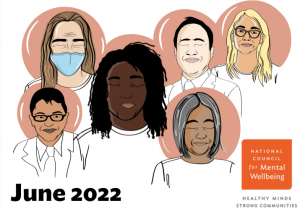 The National Council for Mental Wellbeing created this graphic essay to increase understanding of the Morbidity and Mortality Weekly Report (MMWR) and Public Health Workforce Interests and Needs Survey (PH WINS) conclusion that “implementing prevention and control practices that eliminate, reduce and manage factors that cause or contribute to public health workers’ adverse mental health status might improve mental health outcomes during this and other public health emergencies,” and to facilitate understanding of:
The National Council for Mental Wellbeing created this graphic essay to increase understanding of the Morbidity and Mortality Weekly Report (MMWR) and Public Health Workforce Interests and Needs Survey (PH WINS) conclusion that “implementing prevention and control practices that eliminate, reduce and manage factors that cause or contribute to public health workers’ adverse mental health status might improve mental health outcomes during this and other public health emergencies,” and to facilitate understanding of:
- The ongoing mental health challenges currently faced by public health workers as highlighted in the MMWR and PH WINS surveys.
- The mental health challenges have been experienced by public health workers, as documented through a series of brief key informant interviews with public health workers across the country.
- Recommendations from workers on how to support public health leadership capacity to build departmental and jurisdictional supports around mental health challenges in the workforce.
- Recommendations from public health workers on current and future training needs.
- Additional reflections on how to support development of the public health workforce and human resource mechanisms to mitigate burnout and ensure ongoing staffing recruitment and retention for the next generation of public health workers.
Interested in learning more? Check out the on-demand webinar, Introducing a Graphic Essay on “Understanding the Public Health Workforce’s COVID-19 Mental Health Challenges”. 1.0 contact hour of CE is available.
Las Disparidades Raciales en el Tratamiento de la Salud Mental: Investigación y Recursos
Este guía contiene información y recursos para ayudar a los hispanoamericanos que necesitan servicios de salud mental.
This guide contains information and resources in support of Hispanic Americans who need mental health services.
Are Our Kids Alright?
This resource from Sandy Hook Promise offers PSAs and more focused around suicide prevention.
Public Health Workforce Resilience Resource Library
This collection of resources focuses on the health and wellbeing of the public health workforce. Offered by the National Association of County and City Health Officials (NACCHO).
Building a Culture of Resilience
COVID-19 and the ongoing pandemic have meant public health professionals face an ever-growing set of demands. From COVID-19 response to organizational expansion, the tasks facing the public health workforce cover a variety of topics. These trainings, focused on building resilience, are designed to help public health professionals achieve success during difficult times.
Offered by the Public Health Training Center Network.
Students (Community of Practice) & Professionals
First developed for students and young professionals, these resources look at the creation of visuals, program evaluations, and more.
Employment Resources
This one-pager highlights additional resources on creating a resume, cover letter, and more.
This tutorial video provides an overview of how to write a resume and cover letter.
Infographics and Flowcharts Tutorial
This tutorial is about understanding and creating infographics and flowcharts. Resource is available via video and printed one-pager.
One-Pager Tutorial & Tip Sheets
This tutorial provides an overview on one-pagers as well as instructions how to craft one step by step. The accompanying how-to and template are downloadable resources:
Program Evaluation 101 Tutorial & Tip Sheets
This tutorial provides an overview on program evaluation. The accompanying tip sheet summary and template are downloadable resources:
Practice-Based Publishing
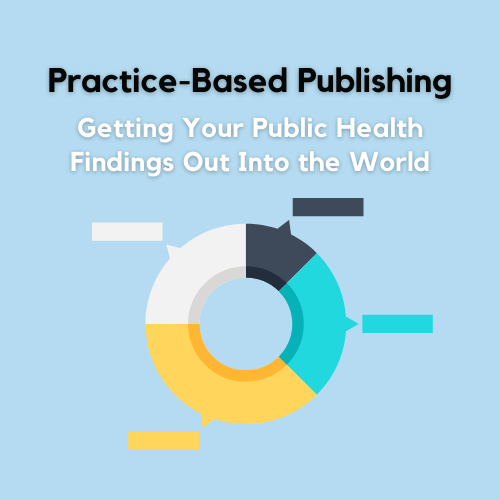
Have you learned any lessons or developed any programs that you want to share? Then our Practice-Based Publishing webinar series is just what you’re looking for!
We partnered with JPHMP Direct and the APHA Health Administration Section to offer a focused webinar series. It begins with an introduction to practice-based publishing, with subsequent sessions discussing how to develop and refine manuscripts.
Session #1 – Introduction to Publishing as a Practitioner
This session will cover the basics of publishing as a practitioner.
Session #2 – Topic, Outline, Background
An open workshop on how to pick a topic, sketch an outline, and develop a background.
Session #3 – Methods & Results
Receive mentoring on how to describe methods and share results.
Session #4 – Discussion & Submission
Focus on writing the discussion and submitting to a journal.
Publications
- Welter, C., Davis, S., Elnicki, J., Kulik, P.K.G., Lloyd, L.M., Tenney, M., Todd Barrett, K., Rose, B., & Walter, C. (2023). Public Health Learning Agenda for Systems Change Toolkit: National Pilot Evaluation Results. J of Public Health Manag Pract, 29(2): 202-209. doi: 10.1097/PHH.0000000000001654 [Manuscript]
- Kulik, P.K.G., Leider, J.P., Rogers, M., Karnik, H., Power, L.E., Schaffer, K., & Bekemeier, B. (2023). PH WINS for All: The Critical Role of Partnerships for Engaging All Local Health Departments in the Public Health Workforce Interests and Needs Survey. J of Public Health Manag Pract, 29(1): S48-S53. doi: 10.1097/PHH.0000000000001635 [Manuscript]
- Lederer, A.M., Barrett, K.T., Shorter, C., Kenefick, H., Kulik, P., Morales, M., Reinschmidt, K., Shrestha, S. (2022). Public Health Training Centers’ Support for Community Health Workers: Case Studies of Needs Assessment, Training, and Student Field Placement Initiatives. J of Public Health Manag Pract, 28(5): pS212-S222. doi: 10.1097/PHH.0000000000001526 [Manuscript]
- Zemmel, D., Kulik, P.K.G., Leider, J.P., Power, L.E. (2022). Public Health Workforce Development During and Beyond the COVID-19 Pandemic: Findings from a Qualitative Training Needs Assessment. J of Public Health Manag Pract, 28(5): S263-S270. doi: 10.1097/PHH.0000000000001524 [Manuscript]
- Beck, A.J. & Kulik, P. (2022). Public Health Practice in the United States. Boulton M.L., & Wallace, R.B. (Eds.), Maxcy-Rosenau-Last Public Health & Preventive Medicine, 16e. McGraw Hill. https://accessmedicine.mhmedical.com/content.aspx?bookid=3078§ionid=256019851 [Textbook Chapter]
- Kulik, P.K.G., Leider, J.P., & Beck, A.J. (2021). Leadership Perspectives on Local Health Department Workforce Development: A Regional Training Needs Assessment. J of Public Health Manag Pract, 28(2): E619-E623. doi: 10.1097/PHH.0000000000001395 [Manuscript]
- Harris, J.K., Leider, J.P, Kulik, P., Beck, A. (2021). Training Networks of Local Health Departments: A Regional Assessment. J Public Health Manag Pract, 28(1): E256-E263. doi: 10.1097/PHH.0000000000001274 [Manuscript]
- Anderson, O.S., August, E., Goldberg P.K., Youatt, E., & Beck, A.J. (2019). Developing a Framework for Population Health in Interprofessional Training: An Interprofessional Education Module. Front. Public Health, 7(58). doi: 10.3389/fpubh.2019.00058. [Manuscript]
